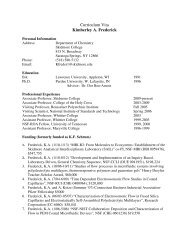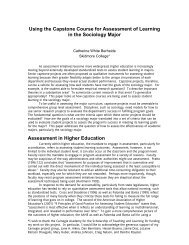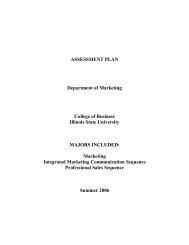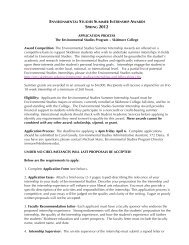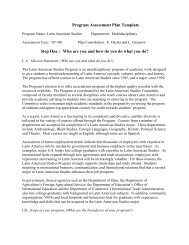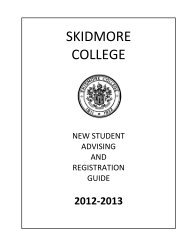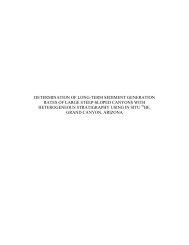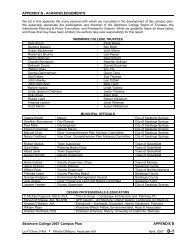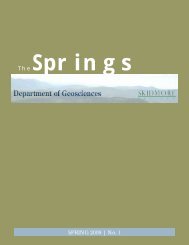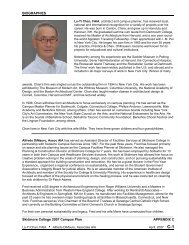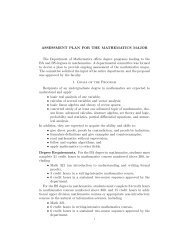Oakland University
Oakland University
Oakland University
You also want an ePaper? Increase the reach of your titles
YUMPU automatically turns print PDFs into web optimized ePapers that Google loves.
Bachelors of Physics Degree<br />
INTRODUCTION<br />
1. Citation of appropriate goals from <strong>Oakland</strong> <strong>University</strong>’s Mission Statement.<br />
(a) “A strong core of liberal arts and sciences [will] ... develop the skills, knowledge and<br />
attitudes essential for successful living and active, concerned citizenship [and] an<br />
enriched life.”<br />
(b) “... curricula prepare students for post-baccalaureate education [or] professional<br />
schools...”<br />
(c) “...research and scholarship reinforce the instructional mission of the university.<br />
Whenever possible students are involved in research projects ....”<br />
(d) “Each program ... ensure[s] .. superior career preparation or enhancement.”<br />
2. Specification of academic unit goals that flow from each of the cited university goals.<br />
(a) “The nature of today's technology is derived from a very few academic disciplines.<br />
Physics is one of these critical areas of expertise, and the department is in a position to<br />
provide unique service to the university community along these lines.”<br />
(b) “Graduates with Bachelor's degree are prepared to purse master's or doctoral studies<br />
in physics.”<br />
(c) “Research activities at <strong>Oakland</strong> reflect a number of factors, primarily connected to<br />
the educational objective. Members of the faculty derive more insight and detailed<br />
experience in newer, developing areas of physics as a result of their research. Not only<br />
are they enabled to communicate more effectively, but students also have the opportunity<br />
to be exposed to first-hand techniques and understanding.”<br />
(d) “The Department of Physics ... is primarily a research department. We see this<br />
orientation as the most important component of the overall department mission, namely<br />
to serve the community in terms of its educational needs in physics.”<br />
3. Operationalization of the unit’s goals into outcomes for student learning.<br />
(a) “The students will master the basic concepts and applications<br />
of physics in the introductory courses and the theories of<br />
classical and modern physics in the advanced courses.”<br />
1
(b) “Students will develop the expertise in the main areas of<br />
physics needed to enter graduate programs.<br />
(c) “Students will develop an understanding of research methods.”<br />
(d) “Students will master the physics needed to understand many technologically<br />
important phenomena.”<br />
4. Description of the methods by which progress toward the operationalized unit<br />
goals will be measured.<br />
The Department of Physics will employ the assessment tools described below.<br />
Alumni Survey (a-d)<br />
A survey of <strong>Oakland</strong> physics alumni will be conducted periodically. A copy of the survey is<br />
attached to this document. The survey contains a series of questions designed to determine if<br />
the students were properly prepared for their careers and how the students perceive their<br />
experience at <strong>Oakland</strong> <strong>University</strong> in general and more specifically the Department of Physics<br />
instruction and facilities.<br />
Program wide assessment examination (a,b)<br />
A program wide assessment examination will be administered to each student in PHY 490 or<br />
PHY 400. The Major Field test was developed by<br />
Educational Testing Services (ETS), a company based in Princeton NJ.<br />
The tests were developed to measure student progress and assess<br />
the educational outcome of major programs (including physics).<br />
ETS provides on-line tests that will be proctored by the faculty member responsible for the<br />
course. The tests are graded by ETS and overall and<br />
sub-scores (for introductory and advanced physics) are reported for individual students and<br />
institutions. Moreover assessment indicators are reported for institutions. The scoring rubric<br />
is attached.<br />
Capstone Course (c)<br />
Each student will be required to take a capstone course (PHY 490)<br />
or (PHY 400) to gain an appreciation of physics research. In each course the students will<br />
be required to write a scientific paper. Descriptions of the<br />
courses and grading system are attached.<br />
Student Publications (c)<br />
The number of publications that have students as co-authors will be monitored to directly<br />
measure the involvement of undergraduates in faculty research programs.<br />
2
5. List the individual(s) who have primary responsibility for administering<br />
assessment activities.<br />
In what follows the “assessment committee'' refers to a group comprised of the assessment<br />
representative (currently K. Elder), the faculty adviser (currently D. Garfinkle) and<br />
Department Chair (currently A. Slavin).<br />
Initiation of the alumni survey is the responsibility of the assessment representative. The<br />
assessment representative will be responsible for the collection of the surveys and initial<br />
statistical analysis. Each member of the assessment committee will read the open-ended<br />
questions on each individual survey. The committee will then prepare a report summarizing<br />
the results.<br />
The program wide examinations will be administered by the faculty responsible for physics<br />
course that the examination was taken in.<br />
Grading of the test and collection of statistics will be conducted by ETS and the reports will<br />
be sent to the assessment representative. The reports will be discussed and analyzed by the<br />
assessment committee.<br />
Grading of the capstone course final scientific paper will be the responsibility of the faculty<br />
member responsible for the course and at least one other faculty member who has expertise<br />
in the research area covered in the scientific paper. The assessment representative will be<br />
responsible for collection of statistics and analysis of results.<br />
6. Describe the procedures used in your academic unit for translating assessment<br />
results into program changes.<br />
The assessment committee will meet periodically to review the results of the assessment<br />
measurements and assess whether program changes are required to achieve the program<br />
goals. If it is determined that changes are required the assessment committee will prepare<br />
recommendations that will be presented and discussed by the entire physics faculty. The<br />
entire faculty will then determine which recommendations should be implemented. Once<br />
implemented, the impact of the changes will be evaluated using the assessment tools<br />
described earlier.<br />
3
Evaluation of Scientific Papers,<br />
Does the paper address interesting and important physical<br />
phenomena? (1-20)<br />
Is the paper scientifically sound and not misleading? (1-20)<br />
Is the paper well organized and clearly written? (1-20)<br />
Does the essay provide adequate historical perspective<br />
for the topic presented? (1-20)<br />
Overall impression of paper (1-20)<br />
4
Grade<br />
A 90-100 (3.5-4.0)<br />
B 80-89 (3.0-.3.5)<br />
C 70-79 (2.0-2.9)<br />
D 60-69 (1.0-1.9)<br />
5



